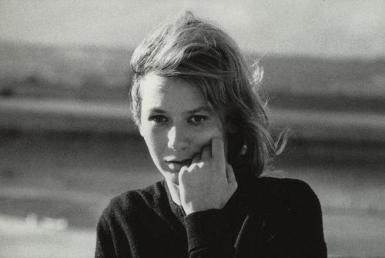La Jetée (Day 80)
 My Opinion: 7.3 || High marks for the number of stimulating ideas packed into 28 minutes and for the uniqueness of the vision. But the experimental structure is just as limiting as it is liberating. An interesting excursion more than a fully satisfying trip.
My Opinion: 7.3 || High marks for the number of stimulating ideas packed into 28 minutes and for the uniqueness of the vision. But the experimental structure is just as limiting as it is liberating. An interesting excursion more than a fully satisfying trip.
TITLE: La Jetée
DIRECTOR: Chris Marker
LANGUAGE: French | COUNTRY: France
YEAR: 1962
PROFILE: Science Fiction | 28 minutes | IMDb (8.3)
SYNOPSIS (Courtesy of IMDb): Time travel, still images, a past, present and future and the aftermath of World War III. The tale of a man, a slave, sent back and forth, in and out of time, to find a solution to the world’s fate. To replenish its decreasing stocks of food, medicine and energies, and in doing so, resulting in a perpetual memory of a lone female, life, death and past events that are recreated on an airports jetée.
Strengths: The movie is told almost exclusively with still images, which would be tedious for 90 minutes but remains fascinating for 28. It’s built around a time-travel plot that director Chris Marker designs cleverly. (It seems probable that it heavily influenced 12 Monkeys and other entries in the post-apocalyptic-time-travel genre.) At its best, the movie works as a haunting exploration of memory, raising provocative ideas about the mind.

Weaknesses: The film’s still images are composed from a very narrow palate (dark and grainy). There are occasional images that work beautifully — mostly ones that focus on the female face — but the consistent dimness of the imagery winds up being more limiting that the stillness itself. More important, by presenting the remembered/re-visited past in the same static, low-fi mode as the post-apocalyptic present, Marker misses opportunities to differentiate the environments and experiences.
One could argue, too, that he would have been better off restricting himself to the protagonist’s point of view in scenes that project into the past. (In other words, not showing the protagonist viewed from an external perspective.) A debatable point, but the movie is best when evoking the subjectivity of memory, and an embrace of pure subjectivity would have added a dreamy power to those scenes.
As is usually (always?) the case with time-travel stories, the premise is logically flawed. In fact, this premise may be more flawed than most — it’s easier to accept a Terminator-like machine than to buy the mechanism that’s presented here. One advantage of a 28-minute film, though, is that you don’t dwell too long on anything, including implausibilities.

Best Moment: The clear highlight of the film is its one, fleeting moment of movement. It arrives after we’ve been conditioned to expect only still pictures, and the motion is exhilarating. It’s a small moment that normally would have no impact, but here it’s haunting — a testament to the power of stillness and quiet.
File Under: experimental cinema, photography, time travel, post-apocalyptic, haunting